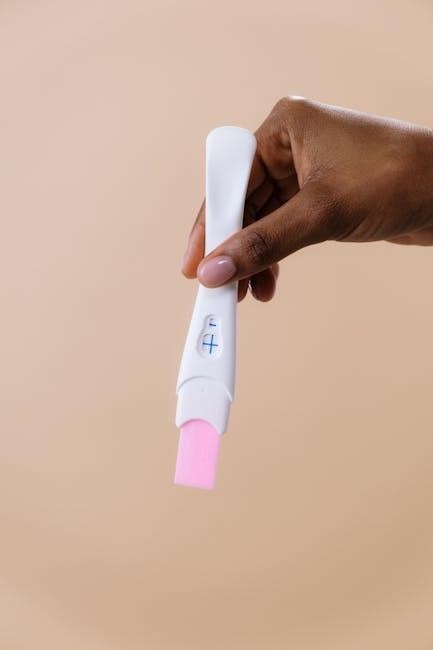The Denver Developmental Screening Test (DDST) is a widely used assessment tool designed to evaluate developmental progress in children from birth to six years․ It focuses on key areas such as gross motor, fine motor, language, and personal-social skills, providing insights into early detection of potential delays․ Introduced in 1967, the test is valued for its simplicity and effectiveness in pediatric and developmental assessments․
1․1 Overview of the Denver Test
The Denver Developmental Screening Test (DDST) is a comprehensive tool designed to assess developmental milestones in children from birth to six years․ It evaluates four key domains: gross motor, fine motor, language, and personal-social skills․ The test is simple, effective, and widely used by pediatricians, psychologists, and educators to identify potential developmental delays early․ Introduced in 1967, the Denver Test has undergone revisions, with the Denver II being the updated version․ It includes a prescreening questionnaire for parents, enhancing its diagnostic accuracy․ The test is not diagnostic but serves as a screening tool to determine if further evaluation is needed․ Its age-specific norms and clear scoring system make it a valuable resource for monitoring healthy development and detecting early signs of developmental challenges in young children․
1․2 Purpose and Objectives
The primary purpose of the Denver Developmental Screening Test (DDST) is to identify children at risk of developmental delays or disorders․ Its main objective is to provide early detection through a simple, non-invasive assessment․ The test aims to evaluate whether a child’s development aligns with expected milestones across four domains: gross motor, fine motor, language, and personal-social skills․ By detecting potential issues early, it enables timely interventions, improving long-term outcomes․ The test is not diagnostic but serves as a screening tool, guiding further evaluations when necessary․ Its design ensures accessibility for various professionals, making it a valuable resource in pediatric care and educational settings․ The Denver Test emphasizes early identification to support children’s optimal development and address delays promptly, aligning with its core objective of enhancing developmental outcomes through early intervention․
1․3 Age Range and Applicability
The Denver Developmental Screening Test (DDST) is designed for children aged 0 to 6 years, making it a comprehensive tool for early childhood development assessment․ It is particularly effective for identifying delays in infants and young children, ensuring timely intervention․ The test is applicable for use by pediatricians, psychologists, educators, and other professionals involved in child development․ Its broad age range allows for longitudinal monitoring of developmental milestones, from infancy through early school age․ The Denver Test is widely used in clinical settings, schools, and community programs, emphasizing its versatility and accessibility․ By focusing on this age range, the test addresses critical periods of growth and development, making it an essential resource for promoting healthy development in children․

Structure of the Denver Developmental Screening Test
The Denver Test evaluates personal-social, fine motor, language, and gross motor skills, offering a comprehensive assessment of developmental milestones through specific tasks and observations, tailored to children’s abilities and age-appropriate expectations․

2․1 Personal-Social Skills Assessment
The personal-social skills assessment evaluates a child’s ability to interact socially and develop emotional intelligence․ This section includes tasks such as smiling, waving goodbye, showing affection, and cooperating with others․ It measures milestones like initiating interactions, understanding social cues, and demonstrating independence․ Observations focus on how the child responds to their environment and engages with others․ The test also assesses self-care skills, such as dressing and using utensils appropriately․ These observations help identify if a child is developing typical social behaviors or if there may be delays in interpersonal interactions․ The results provide insights into the child’s emotional and social development, guiding early interventions if necessary․ This section is crucial for understanding a child’s overall social competence and emotional well-being․
2․2 Fine Motor Skills Evaluation
The fine motor skills evaluation assesses a child’s ability to perform precise movements using smaller muscle groups, such as those in the hands and fingers․ Tasks include activities like picking up small objects, drawing simple shapes, and using utensils․ The test observes how well a child can manipulate items, such as stacking blocks, using scissors, or buttoning clothing․ These tasks help determine if the child’s fine motor development is progressing at an expected pace․ The evaluation also considers hand dominance and coordination, as these are critical indicators of fine motor proficiency․ Results from this section provide insights into the child’s dexterity and ability to perform everyday tasks requiring precision․ This assessment is vital for identifying potential delays in fine motor development and guiding early intervention strategies․
2․3 Language and Communication Development
The Denver Developmental Screening Test evaluates language and communication skills to assess a child’s ability to understand and express ideas․ This section focuses on both receptive and expressive language, including verbal and non-verbal communication․ Tasks may involve identifying objects, following directions, and engaging in simple conversations․ The test also observes the child’s ability to form sentences, use appropriate grammar, and demonstrate an age-appropriate vocabulary․ Additionally, it assesses pre-linguistic skills, such as babbling in infants and gesturing in toddlers․ The evaluation helps identify delays or difficulties in communication, which are critical for early intervention․ By monitoring these skills, professionals can provide targeted support to enhance language development and ensure the child meets essential milestones․ This section is vital for detecting potential speech or language disorders, enabling timely and effective intervention strategies․
2․4 Gross Motor Skills Assessment
The Denver Developmental Screening Test evaluates gross motor skills to assess a child’s physical development, focusing on large muscle groups․ This section examines abilities such as crawling, walking, running, jumping, and maintaining balance․ Tasks are age-specific, ensuring accurate assessment of developmental milestones․ For instance, infants are observed for rolling and reaching, while toddlers are evaluated on their ability to walk independently and climb․ The test also assesses coordination and overall physical fitness․ Early detection of delays in gross motor skills can lead to targeted interventions, improving mobility and coordination․ This section is crucial for identifying potential issues related to physical development, ensuring timely support for children needing it․ By monitoring these skills, professionals can track progress and provide guidance for enhancing physical abilities․ This assessment is a cornerstone of the Denver Test, offering insights into a child’s overall motor development․

Administration and Scoring of the Denver Test
The Denver Test is administered to children aged 0-6 years, evaluating developmental milestones․ Scoring involves checkboxes for typical behavior, compliance, and task performance, with specific criteria for each age group․
3․1 Test Administration Process
The Denver Developmental Screening Test (DDST) is administered by trained professionals, typically in clinical or pediatric settings․ The process involves observing and interacting with the child to assess developmental milestones across four key areas: gross motor, fine motor, language, and personal-social skills․ The test is divided into age-specific sections, ensuring that each child is evaluated based on expected abilities for their age group․ The administrator uses a standardized approach, documenting the child’s responses and behaviors․ Compliance and cooperation from the child are noted, as these factors can influence test outcomes․ The entire process is designed to be non-invasive and engaging for young children, ensuring accurate and reliable results․ Proper administration is crucial for identifying potential developmental delays and guiding further interventions if necessary․
3․2 Scoring and Interpretation of Results
The Denver Developmental Screening Test (DDST) results are scored based on the child’s performance across four developmental domains: gross motor, fine motor, language, and personal-social skills․ Each item is marked as “passed,” “failed,” or “no opportunity to observe․” The results are interpreted using standardized criteria, with specific cutoff points for each age group․ A child’s performance is categorized as “normal,” “caution,” or “delayed,” depending on whether they meet, nearly meet, or fail to meet expected milestones․ The “caution” category indicates a need for close monitoring, while “delayed” suggests the need for further evaluation․ The test also includes a Developmental Quotient (DQ) for children under 3 years, providing a numerical score for comparison․ Interpretation guides professionals in identifying potential developmental delays and informing next steps, such as referrals for comprehensive assessments or interventions․
3․3 Denver II Prescreening Developmental Questionnaire
The Denver II Prescreening Developmental Questionnaire (PDQ-II) is a complementary tool to the Denver Developmental Screening Test, designed for parents or caregivers to report on a child’s developmental milestones․ It covers ages from 0 to 6 years and focuses on key domains such as gross motor, fine motor, language, and personal-social skills․ The questionnaire is divided into two parts: one for children aged 0-9 months and another for 2-4 years․ Parents are asked to indicate whether their child can perform specific tasks, providing valuable insights into early developmental progress․ The PDQ-II serves as a preliminary screening tool, helping identify potential delays before administering the full Denver II test․ This early identification allows for timely interventions, ensuring children receive appropriate support to meet their developmental milestones effectively․ The questionnaire is a user-friendly resource for both parents and healthcare providers․

Clinical Significance of the Denver Test
The Denver Developmental Screening Test holds significant clinical value as a tool for early identification of developmental delays in children․ It enables healthcare providers to assess milestones across gross motor, fine motor, language, and personal-social domains, providing insights into potential issues that may require further evaluation․ Early detection through the Denver Test allows for timely interventions, improving outcomes for children with developmental challenges․ The test’s simplicity and effectiveness make it a widely used resource in pediatric care․ Additionally, the Denver II Prescreening Developmental Questionnaire complements the test by gathering parental insights, enhancing the accuracy of assessments․ Clinicians rely on the Denver Test to monitor developmental progress and guide appropriate referrals․ Its application extends to research, aiding in understanding growth patterns and the effectiveness of interventions․ Overall, the Denver Test is a cornerstone in developmental surveillance, supporting both clinical practice and research endeavors․



